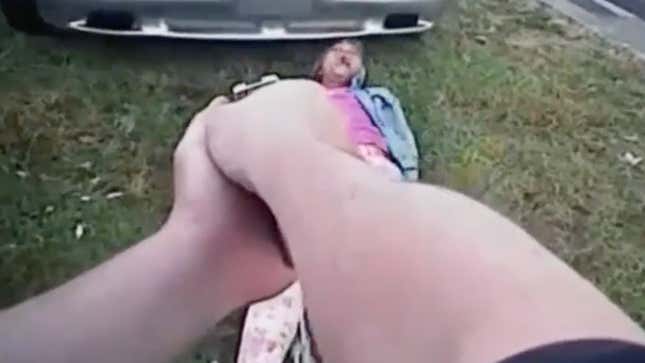
A Kentucky police officer tased a black woman for doing exactly what he told her to do. His police-issued body camera captured the entire incident on video. Over the course of a two-year “investigation,” the cop remained on patrol and used excessive force on at least two more people before he was eventually fired.
He was not arrested and his official police certification was not affected.
On Oct. 16, 2016, someone reported that two suspicious individuals were lurking in front of a Louisville, Ky., home, WDRB reports. When Louisville Metro Police Department officer Greg Satterly arrived, he found Nyshan and Stephon Beckam sitting in a van outside of their family’s home.
The video shows the couple informing Satterly that they were not trespassing, explaining that they were simply waiting for family members to return home so they could pick up their children, who were staying with the relatives who owned the home. When Nyshan, who was a passenger in the van, refused to give officers her identification (as is her legal right) and asked to speak to a supervisor, Satterly forced her out of the vehicle, threw her on the ground, straddled the unarmed woman and repeatedly instructed her to put her hands behind her back.
“My hands are behind my back!” Nyshan yelled, complying with Satterly’s only verbal command. “I asked to speak to a…”
Satterly tasered her.
Unsatisfied, he tried to taser the woman again.
Then, after electrocuting Nyshan for good measure, Satterly walked over to the other officer, who is black, and smashed Stephon’s head into the concrete as the black officer loudly tells Satterly that Stephon is not resisting. Then Satterly accuses Stephon of not providing his identification.
“What are you talking about, bruh?” Stephon replies. “I got my shit in my hand!”
In January 2017, the Louisville Metro Police opened an investigation into the incident. Satterly would later tell investigators that the “aggressive” Beckams “jumped out of the van” and “came at him.” Even though the video clearly shows that this was not the case, the department allowed Satterly to continue to patrol the streets of Louisville.
That same month, on Jan. 24, Satterly admittedly used excessive force on another handcuffed suspect and acknowledged that he “could have handled the situation different.”
He stayed on the job.
In November of that year, Satterly reportedly used inappropriate force on yet another handcuffed man in front of the man’s child, injuring the suspect’s hand. During the incident, Satterly allegedly refused to call for medical care. In that incident, officials determined that Satterly lied about the injury, the arrest and whether he even used force.
He stayed on the job.
“Unfortunately, after reviewing these cases, I believe our community needs to be protected from you,” wrote Louisville Metro Police Chief Steve Conrad. In an April 2019 termination letter, Conrad noted that Satterly had a “pattern of aggressive and angry behavior.”
Unfortunately.
“Unfortunately,” the episodes of police brutality didn’t cause Satterly to lose his Peace Officer Professional Standards Certification (POPS)—the certification required by all law enforcement officers in the state. A council can terminate a POPS certification if an agency reports an officer has “unfortunately” abused their powers or broken the law. “Unfortunately,” in Kentucky, even when officers who were found guilty of using excessive force, they routinely gained jobs in other police departments because law enforcement agencies were not required to report police misconduct.
“At the time of former Officer Gregory Satterley’s termination, there was no statutory regulation to take any action regarding his POPS certification, “ LMPD spokesperson Dwight Mitchell told WDRB. “The statue changed in June of 2019. His termination took place in April 2019.”
Neither Conrad nor the LMPD reported Satterly for the alleged incidents.
The charges against the Beckams were eventually dropped and Louisville settled with the couple, paying them $50,000. Satterly is still eligible to work as a police officer, although it is impossible to know how many unreported incidents of police brutality he may have committed.
Unfortunately.

